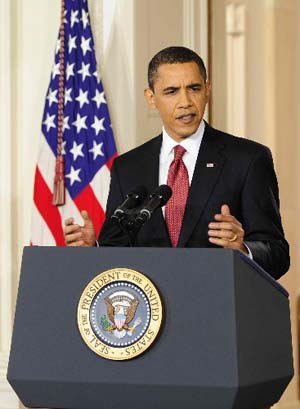Obama's appearance comes on the heels of the unveiling of the Treasury Department's long-awaited toxic asset plan, which Obama said was one part of the third step to tackle the financial crisis and revive the ailing economy.
 |
|
US President Barack Obama speaks during a prime time news conference in the East Room of the White House in Washington, March 24, 2009.[Xinhua]
|
"The third part of our strategy is to restart the flow of credit to families and businesses," said Obama, adding his government will "continue to do whatever is necessary in the weeks ahead to ensure the banks Americans depend on have the money they need to lend, even if the economy gets worse."
"Finally, the most critical part of our strategy is to ensure that we do not return to an economic cycle of bubble and bust in this country," he stressed.
Speaking in the East Room of the White House, Obama urged the Congress to grant his government broad power to seize non-bank financial companies whose collapse could jeopardize the economy.
"We should have obtained it much earlier so that any institution that poses a systemic risk that can bring down the financial system, we can handle and we can do it in an orderly fashion, that quarantines it from other institutions," Obama said at the conference.
"We don't have that power right now, that's what (Treasury) Secretary (Timothy) Geithner is talking about and I think there's going to be strong support from the American people and Congress to provide that authority," he said.
Both Geithner and Federal Reserve Chairman Ben Bernanke, who appeared at Tuesday's hearing in the House, called on the Congress to grant the Treasury "legal means to manage the orderly restructuring of a large, complex non-bank financial institution."
The US government currently has the authority to seize only banks. A change in the Treasury Department's power would need to be approved by the Congress.
Obama also expressed his confidence in the US dollar. "As far as confidence in the US economy or the dollar, I would just point out that the dollar is extraordinarily strong right now," he said.
"The reason the dollar is strong right now is because investors consider the United States the strongest economy in the world with the most stable political system in the world," he noted.
He also said there is no need for a new global currency as an alternative to the dollar. "I don't believe that there's a need for global currency," said Obama.
In an article posted on the website of the People's Bank of China on Monday, the bank's Governor Zhou Xiaochuan proposed to create a super-sovereign reserve currency as part of reform in the international monetary system.
The desirable goal of the international monetary system is to "create an international reserve currency that is disconnected from individual nations and is able to remain stable in the long run, thus removing the inherent deficiencies caused by using credit-based national currencies," Zhou said.
The Special Drawing Right (SDR) of the International Monetary Fund (IMF) has the potential to act as a super-sovereign reserve currency, said the Chinese central bank chief, admitting the creation of a new reserve currency is a long-term goal that requires foresight and courage from state leaders of various countries.
(Xinhua News Agency March 25, 2009)